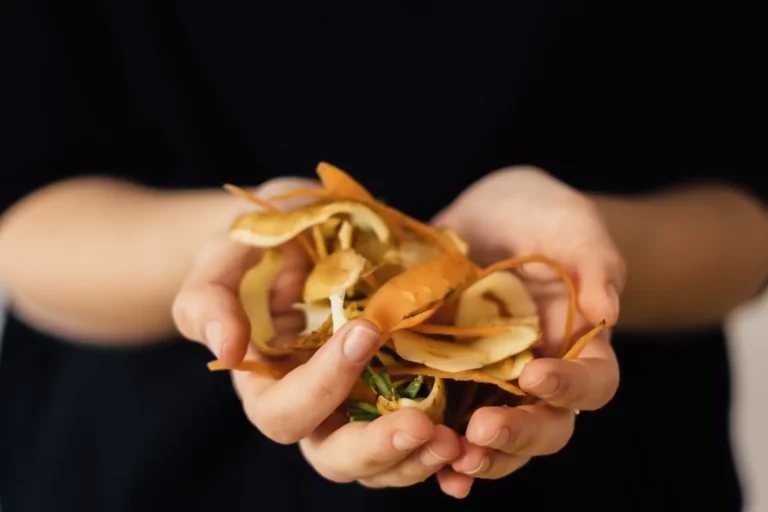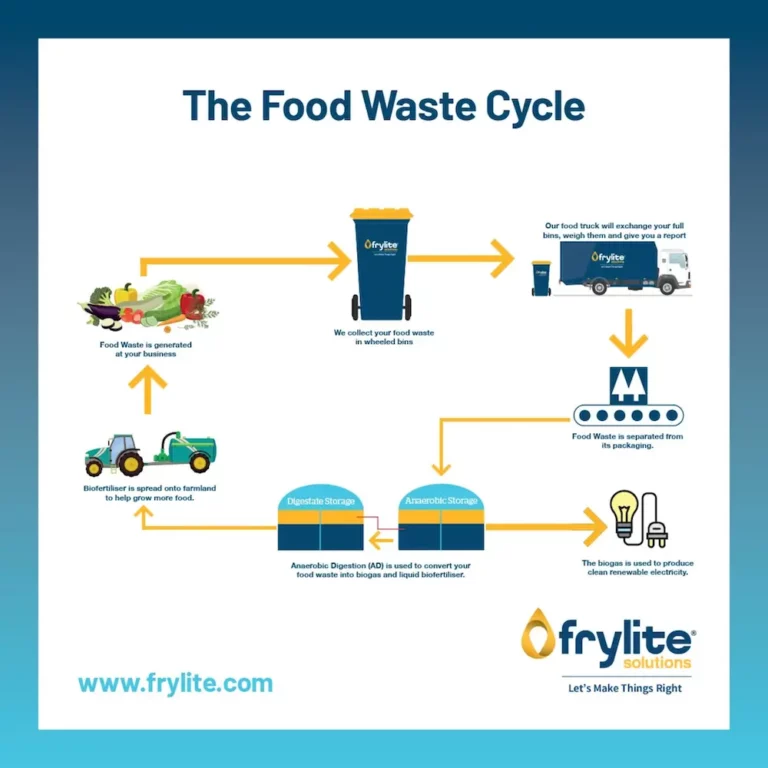Food Waste in Ireland 2024
In 2024, Ireland’s food service industry faces a critical challenge: food waste. It’s a problem that affects not just our environment, but our bottom lines and our community’s well-being. The latest food waste statistics reveal that the sector is a significant contributor to food waste in Ireland, underscoring the urgent need for action. This isn’t just about good practice; it’s about survival and responsibility.
Reducing food waste is imperative for the health of our planet and for the efficiency of our businesses. Here at Frylite Solutions, we aim to shed light on the scale of the issue, offering both insights and practical solutions. We’ll explore the latest figures to understand the extent of food waste in Ireland’s food service industry and explore why addressing this issue should be a top priority.
Plus, we will highlight actionable strategies that restaurants, catering companies and food processors can implement to minimise waste. From smarter purchasing to innovative waste management practices, there are numerous ways for businesses to make a difference. Understanding the impact of food waste goes beyond environmental concerns – it’s about enhancing operational efficiency, reducing costs, and contributing to a more sustainable future.
Frylite Solutions is at the forefront of providing solutions tailored to the food service industry’s unique needs. Gain a clearer understanding of the critical role this sector plays in combating food waste and how embracing sustainable practices can benefit your business and the wider community.
Food Waste Statistics in Ireland
The battle against food waste in Ireland’s food service industry is underpinned by hard numbers that reflect both challenges and opportunities for change. In 2021, Ireland generated approximately 753,000 tonnes of food waste across various sectors, with the restaurant and food service sector accounting for about 189,000 tonnes, or 25% of the total. This figure places restaurants and food services as significant contributors to the food waste problem, underscoring the urgency for targeted actions within this industry.
Comparatively, looking at previous data, it’s clear that the issue of food waste has been persistent. While specific year-on-year comparisons might vary, the overall trend indicates that food waste remains a substantial issue within Ireland, necessitating continuous efforts for improvement. The Environmental Protection Agency (EPA) emphasises that households are the largest contributors, closely followed by the manufacturing and processing sector, each accounting for 29% of the total food waste. However, the considerable contribution from the restaurant sector highlights a specific area where targeted interventions can have a profound impact.
The National Food Waste Prevention Roadmap for 2023-2025 outlines Ireland’s commitment to reducing food waste by 50% by 2030, aligning with the United Nations Sustainable Development Goals. This ambitious target reflects a growing awareness and a collective push towards more sustainable practices across all sectors, including restaurants and food services.
In light of these statistics, it’s clear that while the challenge is significant, so is the opportunity for the restaurant and food service industry to lead by example. By implementing more sustainable practices, restaurants, catering companies, food processors, and other businesses in the industry can not only contribute to a vital environmental cause but also find operational efficiencies and cost savings. The EPA and the Irish government provide resources and guidance to support businesses in this transition, emphasising the importance of measurement, management, and innovation in tackling food waste.
Why Should We Care?

The economic ramifications of food waste are equally compelling. For the restaurant industry, every kilogram of food wasted represents a direct loss of revenue. Nationally, the cost of food waste extends into billions of euros annually, encompassing not only lost economic value but also the cost of waste management. With restaurants and food services contributing a significant portion of food waste, there’s a clear financial incentive for businesses to implement waste reduction strategies. Reducing waste can lead to substantial cost savings and more efficient operations, providing a competitive edge in the industry.
Food waste also has a social dimension. In a country like Ireland, where community and solidarity are valued, the issue of food insecurity can’t be overlooked. The paradox of food being wasted while some community members face food poverty highlights the need for more equitable food distribution. Initiatives like food donation and redistribution can turn potential waste into vital support for those in need. The EPA’s support for food redistribution efforts illustrates the potential to address food waste and social issues concurrently.
How You Can Help Reduce Food Waste
In the restaurant and food service industry, reducing food waste not only makes environmental sense but also economic sense. Here are practical ways restaurants, catering businesses, and food processors can actively participate in reducing food waste, alongside highlighting some community programs and technological aids that can support these efforts:
1. Audit Your Waste
Start by understanding where your waste is coming from. Conduct regular waste audits to identify the types and quantities of food being thrown away. This insight can help you make targeted changes to reduce waste.
2. Smart Purchasing
Use your waste audit data to adjust your purchasing practices. Buy in quantities that reflect your actual needs, considering peak and off-peak periods. Leveraging technology for inventory management can also ensure you’re only stocking what you need, when you need it.
3. Menu Planning
Restaurants and catering businesses can design the menu to minimise waste. Use ingredients in multiple dishes to ensure that you use up everything you buy. Offering special dishes that utilise leftovers or surplus ingredients can also help reduce waste.
4. Train Your Staff
Educate your team about the importance of reducing food waste and how they can contribute. Simple practices like proper storage, portion control, and being mindful of expiration dates can significantly reduce waste.
5. Donate Surplus Food
Connect with local charities and food banks that accept food donations. Many organisations facilitate the donation of surplus food to those in need, turning potential waste into a valuable resource for the community.
6. Utilise Technology
Several apps and platforms can help food service organisations reduce food waste. For example, apps that connect restaurants with surplus food to potential buyers or charities can help ensure that less food ends up in the bin. These platforms not only help with waste reduction but also offer an opportunity to recover some costs.
7. Community Composting Program
Participate in or start a community composting program. Composting turns food scraps into valuable compost, reducing landfill waste and contributing to soil health. Engaging with local composting initiatives can also connect your business with the broader community’s sustainability efforts.
8. Volunteer & Engage
Encourage your staff to volunteer in community programs focused on food sustainability. Engaging with these programs can provide your team with a broader perspective on food waste and inspire innovative waste reduction practices within your restaurant.
Interesting Facts About Food Waste in Ireland
Food waste in Ireland presents not just a challenge but a fascinating glimpse into behaviours, practices, and potential areas for change. Here are some intriguing facts that highlight the unique aspects of food waste in Ireland:
- Irish households are the largest contributors to food waste, generating approximately 221,000 tonnes annually. This accounts for 29% of the total food waste in the country. It highlights a significant opportunity for not just businesses but also individuals to make a difference.
- The average Irish household loses about €700 per year due to food waste, contributing to a national annual cost of €1.29 billion. This staggering figure demonstrates the economic impact of food waste on a personal and national level.
- Restaurants and food services in Ireland contribute significantly to food waste, with an estimated 189,000 tonnes or 25% of the total.
- The introduction and adoption of the organic waste bin (brown bin) in Irish households have significantly impacted the composting and anaerobic digestion rate of food waste. In 2021, 69% of households with kerbside bin collection service had access to a brown bin, marking progress in the management of food waste at the source.
- Ireland has committed to reducing food waste by 50% by 2030, aligning with the United Nations Sustainable Development Goals.

Addressing Food Waste with Frylite Solutions
As we’ve navigated through the significant challenge of food waste in Ireland, from understanding its impacts to exploring actionable strategies for reduction, it’s clear that the restaurant and food service sector plays a pivotal role in this journey. Food waste affects not just our environment but also the economic viability of businesses and the well-being of our communities. With the right approaches and commitment, the industry can lead the way in creating a more sustainable future.
In 2023, Frylite Solutions made significant strides in managing food waste and contributing to environmental sustainability. Through our dedicated food waste collection services, we’ve played a pivotal role in the generation of renewable energy via anaerobic digestion, showcasing the potential for industry-driven solutions to environmental challenges.
- Preventing Carbon Emissions: Frylite Solutions’ initiatives have prevented approximately 5,497 tonnes of CO2 emissions that would have been generated from fossil fuels. This achievement showcases the importance of diverting food waste from landfills and instead harnessing it as a resource for clean energy production.
- Food Waste Collection: Over the year, we collected 8,422 tonnes of food waste. This effort not only reduces the environmental burden of food waste but also contributes to a circular economy, where waste is transformed into valuable resources.
- Powering Homes with Renewable Energy: The electricity generated from this process was substantial enough to power 4,383 houses for a year. To put this into perspective, this amount of electricity could also power 1.6 million houses for a day, illustrating the significant impact of Frylite Solutions’ food waste management on providing renewable energy sources.
By transforming food waste into clean energy, we’re not just addressing the environmental impact of waste; we’re also contributing to Ireland’s energy sustainability and reducing our reliance on fossil fuels.
Our work in 2023 demonstrates what can be achieved when businesses prioritise sustainability and invest in solutions that benefit both the environment and the community. As we continue to tackle food waste, our efforts not only help mitigate climate change but also pave the way for a more sustainable future.
Frylite Solutions provides innovative solutions tailored to address the unique challenges of food waste within the restaurant and food service sector. From efficient food waste collection systems to sustainable sourcing practices, Frylite Solutions provides the tools and support needed to make meaningful reductions in food waste.
If you’re ready to take the next step towards reducing food waste in your establishment, Frylite Solutions is here to help. We invite restaurant owners, chefs, caterers, food processors and hospitality workers to reach out and learn more about how our solutions can make a difference in your operations. Together, we can turn the tide on food waste, enhancing your business’s sustainability and contributing to a healthier planet.
Contact Frylite Solutions today to explore our range of food waste solutions and join the growing movement of businesses committed to making a positive impact.
STRABANE
- Orchard Rd Ind Estate, Strabane BT829FR
- +44 28 71 383133
- in**@fr*****.com
LISBURN
- 6 Ferguson Dr, Lisburn BT28 2EX
- +44 28 71 383133
- in**@fr*****.com
DUBLIN
- St. Annes, Cloughran, Swords
- +353 (0) 14569511
- in**@fr*****.com
GALWAY
- Kilcolgan, County Galway
- +353 (0) 91776752
- in**@fr*****.com
CORK
- Unit 1, GB Business Park, Little Island
- +353 (0) 214232392
- in**@fr*****.com
We supply a range of quality cooking oils straight to your door at prices that make sense.
Our reliable service collects waste cooking oil, making us the natural choice for complete vegetable oil solutions.
Everything we collect from the food industry is converted into renewable energy.
